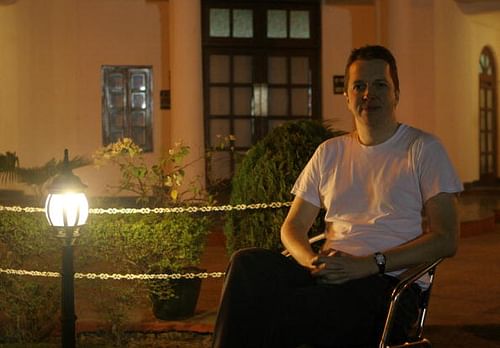
Nigel Short: I don't doubt it is possible for Anand to raise his game, question is can he, here in Chennai?

British GM Nigel Short
This is the second part of GM Nigel Short’s preview of the 2013 World Chess Championship between Vishwanathan Anand and Magnus Carlsen beginning November 9 in Chennai. You can read the first part of the chess preview on our site.
Nigel Short Preview – Part 2 in Indian Express
Energy of youth vs years of wisdom
There is an immense self confidence — which to the uninitiated borders on arrogance — about Magnus Carlsen. Summarising the prospects of Vishwanathan Anand and himself in an interview for “Chess” magazine, earlier this year, the 22 year-old Norwegian stated “The difference (between us) is that I’ve been winning tournaments and he’s been holding on to his title. It will be an interesting clash between two different ideas of what constitutes the best player in the world”.
It was perhaps not the politest thing to say about one of the greatest players in history, but then again it was probably not intended to be. The psychological warfare has already begun. From Anand’s perspective, the most wounding aspect of this remark — ignoring the not-so-subtle reminder that Carlsen will easily remain the number one ranked player regardless of whether he wins or not — is that it is essentially true.
Carlsen is blessed with a superb memory, an uncanny sense of harmony and a sharp tactical eye. In terms of pure chess attributes, however, I don’t think he holds any advantage, whatsoever, over the defending champion.
I agree with the Russian Grandmaster, Vladimir Kramnik, that Carlsen’s main assets are youthful energy, a good nervous system, incredible motivation and a deadly killer instinct. Such qualities cannot be dismissed as a bag of tricks: World Championships are played under tremendous pressure and these things really do count for a lot.
Tough nut
Anand is not devoid of chances though. His vast match experience should hold him in good stead. He has come a very long way from the fluffy, little rabbit who disintegrated the moment Kasparov put him under pressure in 1995. He has added toughness, resilience and wisdom to his armoury. Playing one-on- one for weeks on end is a true test of character and is a far cry from psychologically less demanding tournament play — where Carlsen excels.
Indeed the Norwegian is practically a virgin in this demanding field. Matches require deep introspection because any flaws will be ruthlessly exposed. He will have to learn on the job. Other factors may also work in Anand’s favour. For a start he is playing on home soil with a partisan crowd. Huge numbers of cheering fans can occasionally be a distraction but, in this case, they ought to give his confidence a welcome boost. Both climate and cuisine could pose problems for Carlsen.
Your writer has plenty of experience of playing in India — winning the Commonwealth Championship twice in Mumbai and once in Nagpur. Nevertheless, on a couple of other occasions, I have suffered the most debilitating food poisoning, as Europeans are sometimes prone to do. In case Carlsen succumbs as I have done previously, he will not be able to beat his grandmother, let alone a player of Anand’s class.
Alert to the danger, Carlsen has included a chef in his entourage. Some people have ridiculed this move, saying he should enjoy the delights of local offerings — apparently forgetting he is not going to Chennai as a tourist, but to do an important job. As a prophylactic measure it is probably money very well spent.
With the same concern in mind, his manager has negotiated an optional “time-out” for each participant, in case of illness. This is not popular with the public and goes against the trend of ever shorter matches, but is by no means unprecedented historically. Indeed, in the great Karpov-Kasparov matches of the 80s and 90s each player could call a temporary halt to proceedings on no less than 3 occasions.
Age difference
Anand’s last purely chess advantage is perhaps his opening play. Despite being from an older generation, he is adept at extremely sophisticated computer preparation. His dismantling of Kramnik in 2008 was a prime example of nuking an opponent before he could even begin to show his capabilities.
Carlsen’s openings choices are far more intelligent and cunning than he is generally given credit for. Nevertheless he is not renowned as a theoretician and is much less likely to unleash devastating analysis-engine based novelties. With his immense versatility, however, he will probably be content to dodge the missiles, choosing less predictable variations, supremely confident in his own ability simply to outplay Anand from equal positions.
If Carlsen succeeds in this objective, I honestly don’t see any way out for Vishy. He is conceding a colossal age advantage and sooner or later it is going to show. Chess is not an academic discipline where one can display one’s accumulated erudition in written papers at one’s leisure: it is a sport performed in the spotlight under enormous pressure.
For the past three years the sure-footedness that characterised Anand’s finest period has largely deserted him. I don’t doubt it is possible to raise his game, for this, the toughest match of his career. Whether he is likely to, though, is another matter. Eventually the end of the road comes to even the greatest of batsmen.
– Nigel David Short MBE is a British Grandmaster, chess columnist, chess coach and chess commentator. Short earned the Grandmaster title at the age of 19, and was ranked third in the world by FIDE from January 1988 to July 1989. In 1993 he became the first English player to play a World Chess Championship match.)